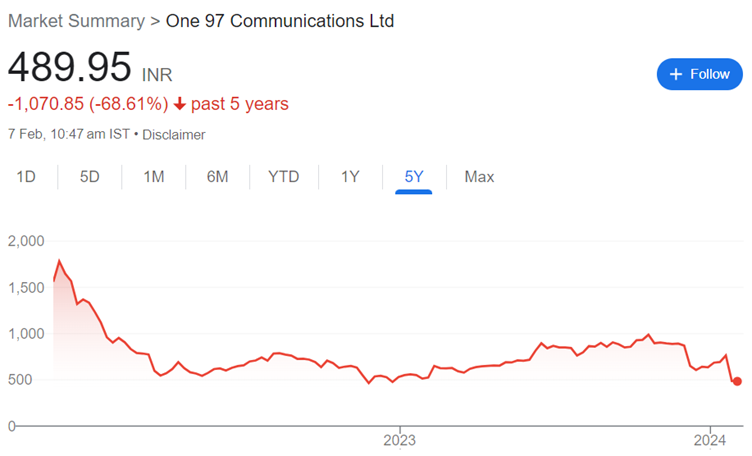
The Paytm Saga: End to the story or revival possible?
Paytm was one of the most sought after startup a decade ago (in 2014 and 2015). Due to its innovative approach to digital payments and rapid growth in the Indian market - Paytm made news every other month. The company entered the market at a time when digital payments were still in their infancy. Being an early player allowed Paytm to establish itself as a leader in the space.
In November 2016, the Indian government announced the demonetization of high-denomination currency notes, leading to a surge in digital payments. Paytm, with its mobile wallet and digital payment services, capitalized on this opportunity, experiencing a significant increase in user adoption and transaction volumes. It became a super-successful business. However, there were two problems:
- It was non-profitable.
- The company decided to go public with no clear direction to profitability.
Paytm IPO and Business Problems
One 97 Communications, the operator of Paytm, came with India's biggest IPO (at that time) with its $2.4 billion offering. The issue price was Rs 2,150 per share. As per most experts, the valuations were exaggerated. As a result, the stock price crashed after the listing. The share price fell by 30% within the first month of listing. The downward strategy continued, and at one time, the stock was down 75% from the issue price.
The main reason for this decline was the hefty valuation and the lack of faith in the company's profitability. The major problem was (and continues to remain) that the company was in too many segments, and it was unclear which would bring the profitability - there seemed a lack of focus and direction. The company did not seem to have have a clear advantage in any segment it operated - payment gateway, consumer lending, financial services, and more. There are competitors and established ones.
We mentioned that Paytm was the coolest startup because it had the wallet business. The wallet business was disrupted by the exponential growth of the United Payment Interface (UPI). The wallet business has become irrelevant with the UPI.
Non-compliance is not new to Paytm
You heard it right. Paytm is not under the RBI's radar for the first time. There have been four instances in the last six to seven years. Let us look at all the instances.
Instance 1: In the initial days of operation, PPBL faced regulatory issues. The first issue was around violations of licensing conditions, which included breaches of day-end balances and non-compliance with KYC guidelines. As a result, the RBI asked the PPBL to temporarily halt the opening of a new account in June 2018. However, later in the year (December 2018), the ban was lifted after they submitted compliance reports.
Instance 2: In October 2021, the RBI found that PPBL had submitted false information to the central bank. As a result, the PPBL was fined Rs 1 crore.
Instance 3: In March 2022, RBI directed the Payments Bank to stop onboarding new customers with immediate effect and to appoint an external audit firm to conduct a comprehensive system audit. The RBI had to take this action after it found lapses in cybersecurity, technology, and KYC anti-money laundering compliance in 2021. RBI also found that they were using the same servers for One 97 Communication entities and the bank - which is not allowed as per RBI guidelines.
Instance 4: After the auditor report, RBI found that there was no serious action taken by the bank to take corrective action. As a result, in October 2023, the central bank imposed a monetary penalty of Rs 5.39 crore for non-compliance with KYC norms.
The Recent Hit
In the recent mishap with the company, the Reserve Bank of India (RBI) imposed sweeping curbs on Paytm's payments bank business. It included restrictions on accepting new deposits and carrying out credit transactions after February 29. The reason for this restriction was that the RBI has found irregularities in KYC norms, compliance issues, and related party transactions. The RBI looked deeper into Paytm's books because there were concerns about money laundering and questionable transactions that amounted to crores of rupees.
As per reports, Paytm's Payment Bank had thousands of accounts without proper identification. There were instances of multiple account creations using the same PAN. The report said that there were instances where the total transaction value exceeded crores, which was above the regulatory limits for minimum KYC pre-paid instruments.
For all the above reasons, the RBI asked Paytm Payments Bank to stop accepting deposits or top-ups in various instruments after February 29.
The Stock and Business Impact
Post-restrictions, the Paytm stock hit three lower circuits of two 20% and one 10%. On Tuesday morning, the stock hit a lifetime low of Rs 395 per share but recovered after that and closed on a positive note. On Wednesday, too, the share price was trading higher.
However, despite the stock recovery, there are fears among users and small merchants that their payments will be stuck with the bank after the RBI's deadline date.

We have seen a lot of instances where investors have withdrawn their fixed deposits from the PPBL. Paytm said that the order does not impact its user deposits in their savings accounts, wallets, FASTags, and NCMC accounts. All Paytm users can continue to use their existing balances. However, Paytm's top management, during an earnings call last week, said they are working on a migration plan for PPBL, wallet, FASTag, etc. users with other banks.
Also, and importantly, customers can use their Paytm Wallet balances until they are exhausted after February 29. However, there won't be an option to add funds. The same restriction applies to PPBL accounts, FASTags, and other linked services. Withdrawals and transactions are permitted without restrictions.
There are reports that merchants are shifting from PPBL to competitors. Paytm has already said that the current curb by the RBI will have an operational impact of Rs 300 to Rs 500 crore annually.
Speculative reports not helping
If you look at the corporate action section on NSE or BSE - Paytm has to come up with clarification every single day of some sort. There have been reports that the ED is probing Paytm over forex violations. Then, there is news that Jio Financials is in talks with Paytm to acquire Payment Bank. Paytm management has clarified that both of these reports are baseless. To add to this, there is political commentary that has started.
The Future
The buying was seen in the last two days, but retail investors must remain cautious over the uncertainty. As of today, there is a big question mark on their business operation, customer retention strategy, and earning contribution. In a loss-making business, these uncertainties make it difficult to value the business and predict the future stock price.
Paytm's CEO has met with RBI officials directly and with the Finance Minister. However, there has been no positive news for the bank since the meeting.
To sum up
It may happen that Paytm will work with RBI and get things sorted - the best-case scenario. In the process, the company will lose money in revenue, potential customers, and users. However, all this can come back except for the trust - the brand damage is going to stay for a while.
Customers entrust their money and sensitive financial information to financial institutions like Paytm. They expect these banks and financial institutions to have robust security measures to protect their assets and data from theft, fraud, or unauthorized access. Building a reputation for security and reliability is crucial for gaining and retaining customers.
Financial businesses are subject to strict regulatory requirements to ensure the safety and integrity of the financial system. Compliance with these regulations not only protects customers but also enhances trust in the business. Customers feel more secure knowing that the institution operates within the bounds of the law. Trust is the foundation of a successful financial business. If it is lost, it is difficult to have long-term success and sustainability.










